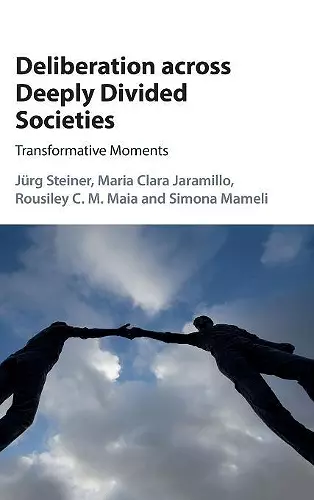Deliberation across Deeply Divided Societies
Transformative Moments
Jurg Steiner author Maria Clara Jaramillo author Rousiley C M Maia author Simona Mameli author
Format:Hardback
Publisher:Cambridge University Press
Published:16th Mar '17
Currently unavailable, and unfortunately no date known when it will be back
This hardback is available in another edition too:
- Paperback£30.99(9781316638217)

This analysis of deliberative transformative moments gives deliberative research a dynamic aspect, opening practical applications in deeply divided societies.
Based on discussion groups with ex-guerrillas and ex-paramilitaries in Colombia, Serbs and Bošnjaks in Bosnia, and police officers and locals in Brazilian favelas, this book has relevance for trouble spots around the world and shows ways in which these deep divisions can be overcome.From the local level to international politics, deliberation helps to increase mutual understanding and trust, in order to arrive at political decisions of high epistemic value and legitimacy. This book gives deliberation a dynamic dimension, analysing how levels of deliberation rise and fall in group discussions, and introducing the concept of 'deliberative transformative moments' and how they can be applied to deeply divided societies, where deliberation is most needed but also most difficult to work. Discussions between ex-guerrillas and ex-paramilitaries in Colombia, Serbs and Bosnjaks in Bosnia-Herzegovina, and police officers and locals in Brazilian favelas are used as case studies, with participants addressing how peace can be attained in their countries. Allowing access to the records and transcripts of the discussions opens an opportunity for practitioners of conflict resolution to apply this research to their work in trouble spots of the world, creating a link between the theory and practice of deliberation.
'This book gives a real twist to studies on deliberation. It examines deliberation as it happens in practice, and it considers deliberation as a practice that all humans are capable of doing; some more, some less skilfully. The book is a felicitous attempt to put deliberation back with its feet on the earthly ground of mundane human activities.' Giovan Francesco Lanzara, Universitá degli studi, Bologna, Italy
'This is a thought-provoking book on a radically new approach to deliberation in the sense that it looks not just at deliberation, but also at the transformative moments in the deliberative process. The description of these transformative moments is incredibly rich, and the authors really put a lot of effort in framing their findings in theoretically sound ways. I have read very few books that offer such an inspiring framework. There is no doubt in my mind that this book will eventually be a bestseller among academics and practitioners alike.' Didier Caluwaerts, Vrije Universiteit Brussel
'This book is the result of a very ambitious undertaking; Jürg Steiner et. al. have compiled and analyzed group discussions among ex-guerrillas and exparamilitaries in Colombia, among Serbs and Bosniaks in Srebrenica in Bosnia and Herzegovina, and among poor community residents and police officers in Brazilian favelas. … With all its complexity, the book is a most valuable addition for the wider deliberation debate.' Nancy A. Vamvakas, Journal of Public Deliberation
'Besides speaking to scholars of conflict resolution and deliberation in general, the book should also be of interest to practitioners in the field. By elaborating on the narratives of the group discussions and by making all the recordings, transcripts and translations publicly available online (also for teaching purposes), the book provides concrete real-world material to understand deliberative dynamics.' Marlène Gerber, Swiss Political Science Review
'Deliberation across deeply divided societies is principally advancing the research agenda on formal and informal factors of deliberative transformative moments in deeply divided societies. But the authors' qualitative-interpretative methodology in micro-environments in Colombia, Bosnia and Herzegovina and Brazil also helps demonstrate that deliberation among ordinary inhabitants is possible, even in polarized societies. In this regard, the book has implications beyond theories of conflict resolution in social, political and communication studies.' Patricia Kaplanova, International Affairs
'In short, this book is a significant milestone and a way for any further exploration of deliberative processes. Those who initially hold that deliberative processes cannot have positive outcomes, or that they cannot be effectively organized will find in this book clear evidence to the contrary. On the other hand, those who do believe in the efficiency and fruitfulness of deliberation will be discover in this book practical suggestions for how to organize their own research and what kind of results they can expect.' Andrija Soc, Theoria
'The book offers many new and fundamental theoretical insights to fructify the academic debate but it also offers insights for the practical application of deliberate theory.' Hugo Marcos, Revista de Estudios Politicos
'Steiner, Jaramillo, Maia, and Mameli (2017), in a series of moderated deliberations between individuals from divided societies, find that rational argumentation and story-telling can sustain high levels of deliberative quality leading to agreement within the groups on key policy topics. Steiner's study - with a focus on how different modes and types of deliberation generate outcomes - is indicative of the type of work needed to show not just that deliberation has desirable effects, but the mechanisms and contexts that are pivotal in these pursuits.' Jonathan W. Kuyper, Journal of Public Deliberation
ISBN: 9781107187726
Dimensions: 235mm x 160mm x 19mm
Weight: 550g
238 pages